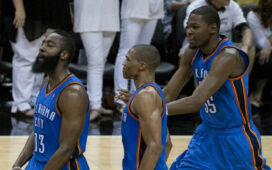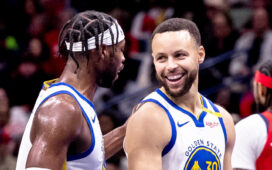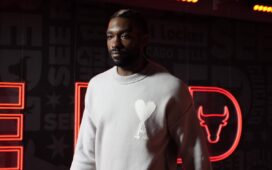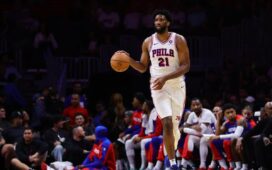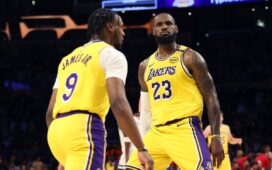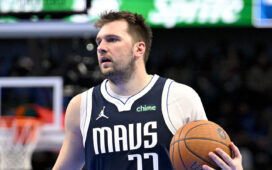One morning, in 2012, Danny Crawford was flipping through The New York Times, and a familiar face stared back. It was one that had yelled at him, laughed with him, cursed at him and shown sympathy toward him. It was a face that Crawford engaged with often because of his line of work, but he didn’t really know.
Crawford stopped turning, sank deeper into his seat and dug into the words beneath the picture.
The face was that of then-Chicago Bulls head coach Tom Thibodeau, who was finishing up his second season as the lead man on the sideline. Crawford, at that point, had been an NBA official for 27 seasons. His working relationship with Thibodeau had grown in recent months with Thibodeau’s status change and the return of the Bulls to relevancy, as well as Crawford’s reputation as one of the game’s best officials.
The story detailed how Thibodeau has dedicated his life to coaching the sport, including how he, later in life, decided to forgo the pursuit of having a family of his own so that he could shackle himself to basketball. Crawford walked away with a lot of the missing gaps filled. He now had a better understanding of what made Thibodeau tick. So, a few days later, with Crawford back in his hometown of Chicago to officiate a game featuring Thibodeau’s Bulls, the playful veteran official wanted to make it known that he read the story about the man who is about basketball, all the time.
“I go up to him and say, ‘Thibs, man. I don’t know if you ever thought about it, but you should think about taking up gardening as a hobby,’” Crawford, a longtime avid gardener who retired from officiating in 2016, recalled via telephone last week. “He was like (playfully), ‘Ah, f— you, Danny.’ I see him four months later, and we get into this small-talk situation again, and he goes, ‘Hey, man. How are your tulips?’ And he walked away smiling.
“That’s the kind of guy he is. He’s really intense, but he means well.”
Thibodeau is as impassioned as any coach you’ll find. His arms are often folded, his eyes piercing, like a bully posted on a brick wall waiting for the final school bell to ring. When they aren’t folded, they’re often flailing out, his back arched, like he’s playing limbo with a high bar. He never takes a seat, whether his team is up 30 or down 30. His voice, when it’s not gone, is so loud it shakes NBA hardwood. Other times, he’s muttering only God knows what under his breath.
Despite what you think about how intimidating Thibodeau appears on the sideline, he’s been a head coach for 13 full seasons, coaching over 900 games and has never been thrown out of an NBA game. Thibodeau is just one of three coaches since 1995 (minimum 10 years of experience) who has never been tossed (the other two are Jeff Van Gundy and Billy Donovan).
Read that again: Thibodeau has never, ever been ejected from an NBA game.
“He seems like the kind of guy you’d want to have a beer with,” said retired NBA official Bill Spooner, who was a referee from 1989-2021.
Ask any NBA referee, and they’ll tell you the imaginary line is real. There is, indeed, a point of no return, where officials feel they have no option but to publicly reprimand a player or coach to keep order. To get there, one must make some form of personal or physical attack. Or maybe a coach or player decides they’re going to complain from the very moment the game starts. Officials do get to use their own discretion to determine when a technical is given or an ejection is warranted based solely on words.
Thibodeau has never crossed that threshold. He’s toed the line, certainly. However, the fact he has finished every game that he’s started in his head coaching career says a lot about who he is as a person. The man loves basketball. He loves coaching it. Some officials believe it would pain him deeply to see his team out there playing without him pulling the strings.
“That man is a coach,” Crawford said. “He’s a hell of a coach, and that is proven. He’s a lifer. He coaches his butt off. He has a passion for it, and I actually love seeing people with such passion. You think of a basketball player who is intense, à la Michael Jordan, and he doesn’t hear anything. Thibs is locked into coaching his team. He means well. He never, ever is disrespectful.”
Like the majority of coaches and players, Thibodeau, too, might talk in vulgarities, several retired officials said, but it’s the way he goes about saying what’s on his mind that has earned him a longer leash. For example, per the officials The Athletic talked to for this story, it wouldn’t be uncommon to hear Thibodeau say something like, “That’s a f—ing travel.” However, no one could imagine him saying something like, “You f—ing idiot. That’s a travel.”
That makes all the difference in the world to the referees.
“He makes it about the play, and doesn’t turn it personal,” Spooner said. “That’s where we draw the line. You can say we messed up a play or that was a ‘Horses—‘ call, but when you start getting personal, like, ‘You’re f—ing horses—,’ that’s where the line is. Thibs never really went there. He’d complain about the play, but he doesn’t dwell. A lot of coaches won’t let it go. Thibs moves on because he’s already thinking, coaching wise, he’s done with refereeing. Too many coaches want to referee the entire game instead of coaching their team. He says what he has to say, and then he’s moving on. He’s more interested in coaching his team.”

GO DEEPER
Karl-Anthony Towns is unapologetically New York
Thibodeau, in news conferences, only ever props up players, his own and those on rival teams. He also doesn’t appear to be interested in belittling the officials, not even behind the scenes.
“I never heard of him calling the league office on officials, and I really respect that,” said retired NBA ref and current ESPN analyst Steve Javie, who officiated from 1986 until 2011. “So many coaches, even when I was there and now, call the office after so many games and complain about the officiating. I never got that inclination from Thibs, nor did I ever hear about him complaining from my bosses. We’d hear other coaches called, but not him. He respected us, and I think that it was a mutual respect, which is kind of cool.”
When thinking back to his time officiating Thibodeau, that thunderous voice is still booming in the mind of Crawford. He couldn’t recall any specific time that he gave Thibodeau a technical, but figured that if the head coach did earn one, it was often because he was so loud. It wasn’t necessarily what Thibodeau said. It’s how he said it. Also, the business side of the game would come into play. The officials do have to police that, as well.
“Where he might get in trouble is everyone hearing him say, ‘That’s a f—ing travel,’ and then you might have to do something,” Crawford said. “That would be disrespectful to the audience because there are kids in the stands. A veteran official would go up to him and say, ‘Hey, man, you got to quiet down,’ and then Thibs would quietly say, ‘C’mon, Danny, that was a f—ing travel.’ It’s about the personal relationship you have with him.
“You do have a personal relationship with him because there are moments when things are going well with him, and he’s funny as hell.”
Javie recalled Thibodeau’s humor quite well.
It was 2011. Thibodeau’s Bulls were in the Eastern Conference finals against the Miami Heat, and Javie and Thibodeau had an exchange that, to the naked eye, looked aggressive and blurring the line of what is acceptable … when, in actuality, that couldn’t be further from the truth.
“He was saying stuff to me with this look on his face, and what he was saying to me had nothing to do about a call,” Javie remembered. “He was like … *mumbles inaudibly* … I go, ‘Hey, Tom. Everyone around here thinks you’re chewing my ass out right now because of a certain play, so can we make it look a little more congenial?’ He doesn’t know how to talk any other way on the court. We were talking about something totally different, and it had to look like, to everyone else, that he was ripping me a new ass. And he said something like, ‘You’re probably right.’
“I think he just gets intense on the floor, but he’s a smart man, and he knows that his job is on that sideline coaching his player. It doesn’t feel like he prescribes to the ‘My star gets thrown out, I’ll get thrown out.’”
Spooner recalled his own back and forth with Thibodeau.
“I remember one time he said something poignant to me, and I said something poignant immediately right back, and Thibs just kept this grin on his face, almost like ‘Oh, we’re having fun now,” Spooner said. “He had the shit-eating grin on his face. I said something about it later like, ‘You thought that was pretty funny, didn’t you?’ And he was like, ‘That was good. That was really good.’”
Spooner didn’t know Thibodeau well, but in sharing the floor with him, he thought there was always a method to his madness. Spooner felt that Thibodeau was never complaining about a call — or no call — just to prove a point, but that his disagreement was always part of something bigger.
“It was like he’d complain about a play, but he was only complaining about the play for when he ran it next time,” Spooner said. “He just seemed like a deep thinker to me.”
Javie was initially shocked to learn that Thibodeau had never been ejected, only because “he looks like this angry guy on the sideline with this curmudgeony look like he’s going to attack someone.” But as Javie thought it about more, the fact that Thibodeau had never been ejected made sense based on his experiences with the coach. Javie said Thibodeau never made personal attacks. He didn’t bark every play. He’d engage in conversation beyond the game.
“He never lost his composure enough that he crossed the line,” Javie said. “Thibs wasn’t a whiner. You have guys who would whine from the moment you throw the ball up, and you’d have to say, ‘Look, that’s enough.’ Then, they’d say, ‘Well, I’m not cursing.’ Then, I’d say, ‘I don’t care if you’re cursing or not, you’re not going to sit here and whine all night.’
“He wasn’t complaining on every play and didn’t cross the line, so when he did start complaining a little bit, you’d show him respect because he treated us with some respect.”
It’s easy to observe Thibodeau on the sideline and come to the conclusion that he’s a mad man — in a way, he is, but not necessarily because of how it appears. Basketball is his entire life, which he shows with each dribble, screen, defensive rotation and shot his team takes.
With Thibodeau, the love and respect for the game comes first, which includes the people in it.
“I’ve got nothing but good things to say about him, and I’ve been in wars with him,” Crawford said. “I’ve come out of those feeling the same way, and that should tell you what kind of guy he is. He’s just an intense, really good guy. That’s Danny Crawford’s opinion.”
(Photo of Thibodeau: Todd Kirkland / Getty Images)
